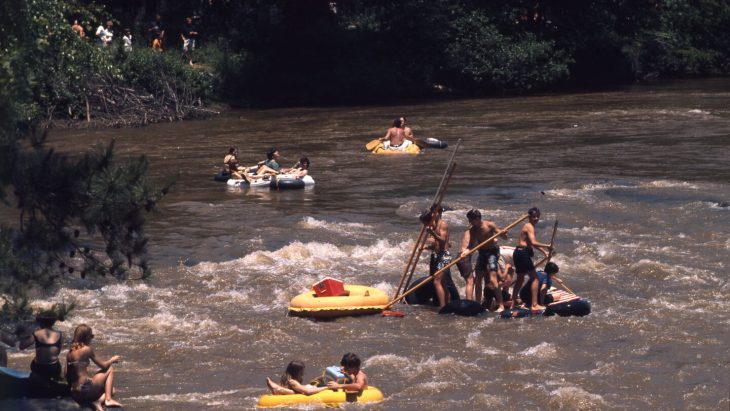
Word of the Day: Levity
Today’s word of the day, thanks to Merriam-Webster, is levity. Levity means “excessive or unseemly frivolity” or “lack of steadiness : changeableness” (https://www.merriam-webster.com/dictionary/levity). M-W goes on to add this: Levity originally was thought to be a physical force exactly like gravity but pulling in the opposite direction, like the helium in a balloon. As recently as the 19th century, scientists were still arguing about its existence. Today levity refers only to lightness in manner. To stern believers of some religious faiths, levity is often regarded as almost sinful. But the word, like its synonym frivolity, now has an old-fashioned ring to it and is usually used only half-seriously” (ibid.).
Etymonline concurs, saying that the word appears in the English language in the “1560s, ‘want of seriousness, frivolity,’ from French levite, from Latin levitatem (nominative levitas) ‘lightness,’ literal and figurative; ‘light-mindedness, frivolity,’ from levis ‘light’ in weight, from PIE root *legwh- ‘not heavy, having little weight.’ In old science (16c.-17c.), the name of a force or property of physical bodies, the opposite of gravity, causing them to tend to rise” (https://www.etymonline.com/search?q=levity). A related verb, levitate, enters the language in the “1670s, ‘to rise by virtue of lightness’ (intransitive), from Latin levitas ‘lightness,’ on the model of gravitate (compare levity). Transitive sense of ‘raise (a person) into the air, cause to become buoyant’ (1870s) is mainly from spiritualism” (ibid.).
According to On This Day, on May 21, 1982, “British troops land on Falkland Islands, in the South Atlantic, to repel Argentine military invasion” (https://www.onthisday.com/events/may/21).
The Falkland Islands are an archipelago, or group of islands, east of the southern tip of South America, off the coast of Argentina, about 400 km from that coast. According to the wiki, “The islands are believed to have been uninhabited prior to European discovery in the 17th century. Controversy exists over the Falklands’ discovery and subsequent colonisation by Europeans. At various times, the islands have had French, British, Spanish, and Argentine settlements. Britain reasserted its rule in 1833, but Argentina maintains its claim to the islands” (https://en.wikipedia.org/wiki/Falkland_Islands). As a side note, you can tell that the wiki was written by someone using British English because “colonization” is spelled with an “s” instead of a “z” (or “zed”).
The islands are not highly populated. As of 2021, there were fewer than 4,000 people living there. Fishing and tourism are part of the economy, but the Falklands are best known for the export of wool. In other words, there are a lot of sheep on the Falklands. According to Farmers Weekly, the number in 2018 was approaching 500,000 (https://www.fwi.co.uk/international-agriculture/farming-front-line-sheep-falkland-islands). FW begins the article about farming on the Falklands by saying, “Farming in the Falklands is not for the faint hearted. The climate can be extreme, it’s a long way from, well, anywhere, and penguins outnumber people by a factor of over 300 to one” (ibid.). Most of the people living on the islands are descendants of British settlers. They must be a hardy bunch.
In April of 1982, Argentina decided to assert its claim on the islands by invading. The Argentine government had been asserting sovereignty over the islands for a couple of decades, if not longer, and Juan Peron finally decided to do something about it. But the undeclared War of the Falklands lasted only about 10 weeks. The British sent naval vessels and Royal Marines, and by June the 14th Argentine had surrendered.
The war had its costs. According to the wiki, “In total, 649 Argentine military personnel, 255 British military personnel, and three Falkland Islanders were killed during the hostilities.” The British and Argentine governments suspended diplomatic relations for about seven years.
“The islanders had full British citizenship restored in 1983; their quality of life improved through investments made by the UK after the war and by economic liberalisation that had been stalled for fear of angering Argentina. In 1985, a new constitution was enacted, promoting self-government which has continued to devolve power to the islanders. The result of the 2013 Falkland Islands sovereignty referendum was 99.8% of the electorate voting for the islands to remain a British territory, with a voter turnout of 92%” (https://en.wikipedia.org/wiki/Falklands_War).
Memory is a funny thing. Back in the 1970s (1969-1980), there was a raft race held on the Chattahoochee River near Atlanta in May of each year. The race was supposedly started by a college fraternity, but it very quickly turned into a major event. A article written about the raft race is called “Woodstock on the Water: An Oral History of the Ramblin’ Raft Race” (https://www.atlantamagazine.com/great-reads/woodstock-on-the-water-an-oral-history-of-the-ramblin-raft-race/). But I clearly remember something that disagrees with this official story.
What I remember is a headline in the Athens Banner-Herald on May 22, 1982. Below the headline was a picture of the raft race on the Chattahoochee River, with guys sitting on or hanging onto the boat, many with cans of beer in their hands. They were chillin’ in the river instead of rollin’. The image today is similar to the one I remember (https://www.atlantahistorycenter.com/blog/the-ramblin-raft-race-a-lost-memorial-day-tradition/).
But the headline above this picture read, “British Invade Falklands.” Yeah, a moment of levity in an otherwise grim moment.